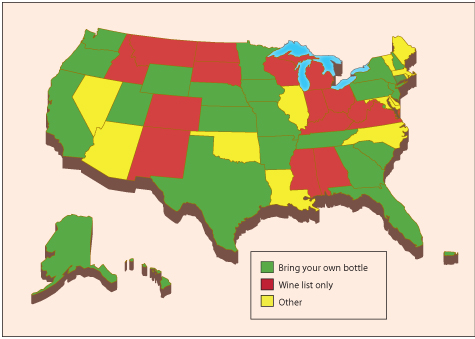Like a Nice Cabernet, Every City Wants a Sip of Philly’s BYOB Culture

Delicious, and affordable. | Shutterstock.com
There are more than 200 BYOBs in Center City alone, some of which count among the very best restaurants in Philadelphia. They’re an essential part of the city’s dining culture, and a legit engine of neighborhood economic development. Many people, including Craig LaBan, have credited BYOBs with shaping Philly’s dining scene in a unique, patron-friendly (no 3X markups!) way.
And none of it would be possible without the state’s permissive laws on restaurant patrons bringing in alcohol. The state’s BYOB law has given restauranteurs who can’t hope to afford one of the limited number of liquor licenses a chance to open new dining establishments nonetheless.
Diners aren’t so lucky everywhere in the country. Over a dozen states, including Ohio and Wisconsin, ban BYOB policies. Last year, the city of Atlanta cracked down on them, enforcing a little-understood policy that requires any establishment with patrons providing their own liquor to buy a special license from the city.
But increasingly, BYOB culture is spreading. Amendments to alcohol policies are passing in both state legislatures and city halls. Virginia and Maryland both reversed their bans in the past few years (2011 and 2012, respectively). Austin, Texas passed its BYOB policy in 2007, which was modeled off Philadelphia’s. And then there’s a handful of states in which municipalities are allowed to set their own policies — including Illinois and Massachusetts — where more and more cities are curbing corkage prohibitions.
The highest-profile showdown is happening right now in Boston, where the City Council is weighing a bill that would open up its restaurant culture to BYOBs. Two City Councilors, Michelle Wu and Stephen Murphy, have introduced an ordinance (citing the success of BYOBs in Philadelphia) that emphasizes the benefits it would have on small businesses:
Thriving neighborhood restaurants can often anchor vibrant and diverse small business districts, and being able to offer wine and beer along with a meal can enhance customers’ dining experiences … The Boston Licensing Board could promulgate regulations to ensure that BYOB in Boston does not impair neighborhood quality of life and fits with each neighborhood’s small business ecosystem.
While other parts of Greater Boston, including Brookline, have instituted BYOB policies already, there’s significant opposition in Boston’s Council. During a hearing on the bill, City Councilwoman Ayanna Pressley (who is a supporter of expanding the fixed pool of liquor licenses) has said that the BYOB ordinance would create a stratified restaurant world in Boston: restaurants with liquor licenses—which can run up to $75,000 (for beer and wine) and $375,000 (for a full bar)—would be predominately in affluent neighborhoods and BYOBs would be concentrated in poorer areas of the city like Dorchester, she said.
But according to a Boston Globe editorial last month, that stratification is already a reality:
One of the unintended consequences of the existing limit on licenses is that many of those licenses have moved out of the neighborhoods and into lucrative downtown locations. Most restaurants need to serve alcohol to be viable, and the migration of liquor licenses in Boston has left swaths of the city with few sit-down restaurants.
There are other arguments against permitting BYOBs. Boston Council President Bill Linehan has expressed concerns that BYOBs would devalue the steep price paid by restaurateurs for liquor licenses. Plus, Linehan argued that BYOBs would lower the overall income of the restaurant industry citywide—that diner checks would be lower because people wouldn’t be paying for booze.
But in cities like Philly and Austin, the restaurant culture was not diluted, but rather, improved by BYOBs—they had a rising-tide-floats-all-boats sort of effect. They’ve even become a calling card for our city. “Welcome to Philadelphia, the Place to b.y.o.be.” was the campaign of the Greater Tourism Philadelphia Market Corporation years ago.
If the bill passes Boston’s City Council, it will reach the desk of Mayor Marty Walsh, who is said to be lukewarm on the measure. But he’s also told the Globe that “We’re trying to make our business districts more successful. The more successful a business district, the more successful a neighborhood.” Look to Philly: BYOBs can help.
